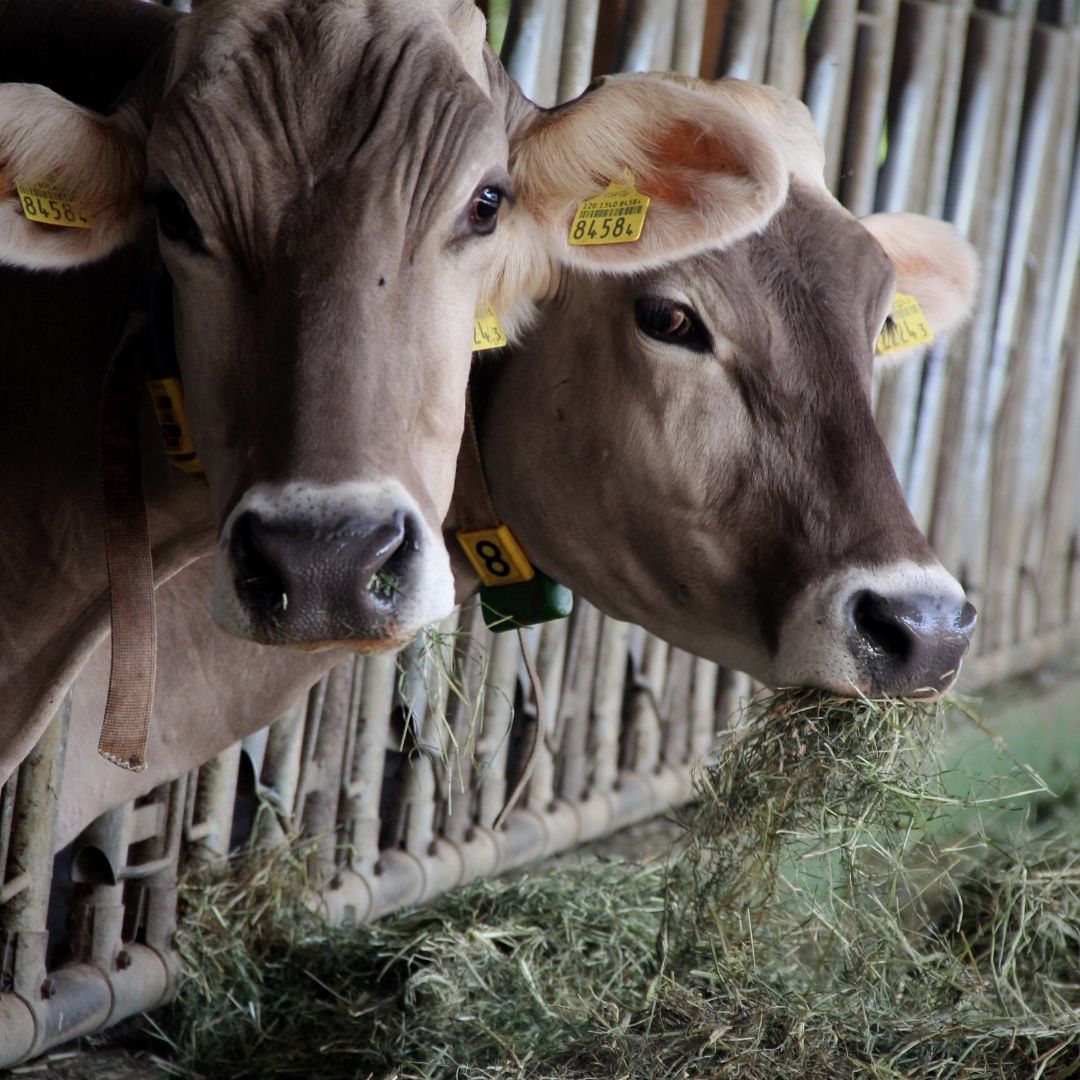Was macht Bio Käse aus?
Bio Produkte sowie Bio Käse sind sehr gefragt. Aber was genau steckt dahinter? Wann darf sich ein Käse Bio nennen? Wir sind dieser Frage auf den Grund gegangen und haben die Kriterien für einen Bio Käse in diesem Blogartikel für Dich zusammengefasst.

Frische Bio-Milch:
Das ist der Hauptrohstoff, um hochwertigen Bio-Käse herzustellen. Damit der Käse schlussendlich in Bio-Qualität verkauft werden darf, müssen über die gesamte Wertschöpfungskette die Bio-Richtlinien eingehalten werden. Aus diesem Grund ist es von grosser Bedeutung, was auf dem Bauernhof passiert und wie die Milch in der Käserei zu Bio-Käse veredelt wird.
Bauernhof:
Die Milch für Schweizer Bio-Käse stammt von Schweizer Bauernhöfen, welche nach den Richtlinien von Bio-Knospe (oder CH-BIO) zertifiziert sind. Dabei spielen das Tierwohl, die Tierhaltung und die Tierernährung eine wichtige Rolle.
Tierwohl:
Die Bäuerinnen und Bauern tragen die Verantwortung für einen respektvollen Umgang mit den Tieren. Kühe werden in Gruppen gehalten, da sie von Natur aus Herdentiere sind. Bereits bei der Auswahl der Tiere wird darauf geachtet, dass es sich um standortgerechte und widerstandsfähige Rassen handelt. Gentechnik ist auf Bio-Bauernhöfen ein absolutes Tabu und auch der präventive Antibiotikaeinsatz ist nicht erlaubt. In Folge dessen setzen Bio-Bauern auf Komplementärmedizin oder ergreifen andere Massnahmen zur Förderung der Gesundheit.



Tierernährung - Tierfutter:
Was die Kuh frisst hat einen direkten Einfluss auf die Zusammensetzung der Milch. Kühe auf zertifizierten Bio-Bauernhöfen werden zu min. 95% mit Gras, Heu oder Silage gefüttert. Der Anteil an Kraftfutter wie Mais oder Gerste darf höchstens 5% betragen. Im Vergleich zu EU-Bio-Milch ist diese Vorgabe viel strenger, weil in der EU für die Fütterung bis zu 40% Kraftfutter erlaubt sind. Studien belegen, dass durch die Verfütterung von Gras und Heu der Anteil an gesunden ungesättigten Fettsäuren erhöht ist.
Tierhaltung:
Tiere auf Bio-Bauernhöfen erhalten genügend Auslauf und verbringen viel Zeit auf der Weide, wo sie nach den besten Gräser, Blumen und Kräuter suchen können. Gemäss den gesetzlichen Vorgaben bedeutet dies, dass Kühe während der Vegetationszeit im Monat an min. 26 Tagen auf die Weide dürfen. Im Winter darf das Vieh zudem min. 13 mal im Monat in den Laufhof. Ebenfalls ist es wichtig, dass der Stall den Bedürfnissen der Kühe so gut wie möglich entgegenkommt. In der Praxis ist es folglich wichtig, dass der Stall für die Tiere ausreichend Platz bietet, die Räumlichkeiten hell sind und Einstreu vorhanden ist. Optimalerweise ist der Stall als Laufstall konzipiert, damit sich die Kühe frei bewegen können und auch die Möglichkeit haben ins Freie zu gehen. In Bezug auf Anbindeställe ist es umso wichtiger, dass die Kühe genügend Auslauf erhalten.
Käserei:
In der Käserei wird die hochwertige Bio-Milch zu Bio-Käse veredelt. Von der Anlieferung der Milch bis zum fertigen Endprodukt müssen die gesetzlichen Vorgaben während der gesamten Herstellung von Bio-Produkten vollständig eingehalten werden. Dazu gehört auch, dass sämtliche Prozessschritte dokumentiert werden und eine lückenlose Rückverfolgbarkeit gewährleistet ist. Insbesondere in Käsereien, wo konventionelle Milch und Milch mit Bio-Qualität verarbeitet wird, ist eine strikte Trennung dieser beiden Produktionslinien unerlässlich. Sollten während der Käseproduktion weitere Zutaten eingesetzt werden wie beispielsweise Kräuter, müssen diese zwingend auch aus biologischem Anbau stammen. Nur mit einem schonenden Umgang der Milch über den gesamten Verarbeitungsprozess kann schlussendlich ein erstklassiges Bio-Käseprodukt entstehen.



Die Natürliche Käsebox von cheezy:
Hast Du nun Lust auf feinen Bio Käse erhalten? Dann entdecke unsere "Natürliche" Käsebox, die es entweder als Einzelbox oder im Abo gibt. Jeden Monat stellen wir für Dich einzigartigen Bio Käse aus Käsereien Schweizweit zusammen. Lass Dich überzeugen.

START YOUR CHEESE ADVENTURE
Simple, convenient and always surprising. Swiss cheese enjoyment at home.
CHEESE BOXES DISCOVER